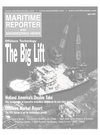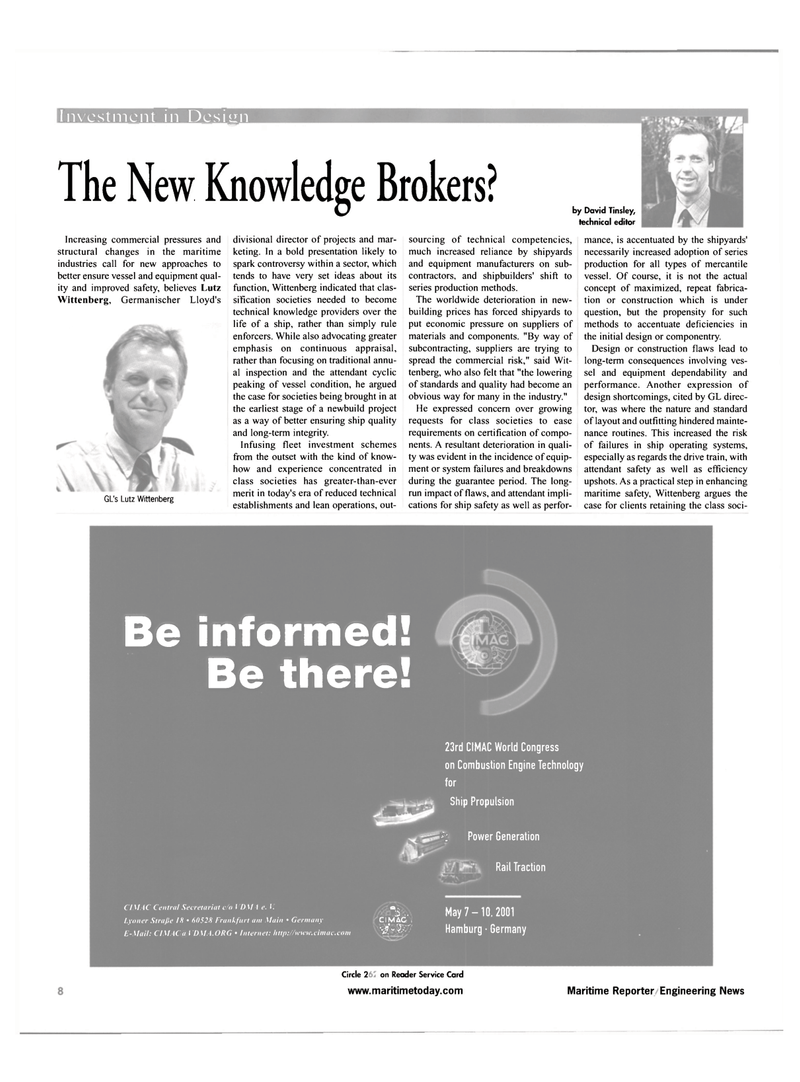
Page 8: of Maritime Reporter Magazine (April 2001)
Read this page in Pdf, Flash or Html5 edition of April 2001 Maritime Reporter Magazine
Investment in Design
The New Knowledge Brokers? by David Tinsley, technical editor
Increasing commercial pressures and structural changes in the maritime industries call for new approaches to better ensure vessel and equipment qual- ity and improved safety, believes Lutz
Wittenberg, Germanischer Lloyd's
GL's Lutz Wittenberg divisional director of projects and mar- keting. In a bold presentation likely to spark controversy within a sector, which tends to have very set ideas about its function, Wittenberg indicated that clas- sification societies needed to become technical knowledge providers over the life of a ship, rather than simply rule enforcers. While also advocating greater emphasis on continuous appraisal, rather than focusing on traditional annu- al inspection and the attendant cyclic peaking of vessel condition, he argued the case for societies being brought in at the earliest stage of a newbuild project as a way of better ensuring ship quality and long-term integrity.
Infusing fleet investment schemes from the outset with the kind of know- how and experience concentrated in class societies has greater-than-ever merit in today's era of reduced technical establishments and lean operations, out- sourcing of technical competencies, much increased reliance by shipyards and equipment manufacturers on sub- contractors, and shipbuilders' shift to series production methods.
The worldwide deterioration in new- building prices has forced shipyards to put economic pressure on suppliers of materials and components. "By way of subcontracting, suppliers are trying to spread the commercial risk," said Wit- tenberg, who also felt that "the lowering of standards and quality had become an obvious way for many in the industry."
He expressed concern over growing requests for class societies to ease requirements on certification of compo- nents. A resultant deterioration in quali- ty was evident in the incidence of equip- ment or system failures and breakdowns during the guarantee period. The long- run impact of flaws, and attendant impli- cations for ship safety as well as perfor- mance, is accentuated by the shipyards' necessarily increased adoption of series production for all types of mercantile vessel. Of course, it is not the actual concept of maximized, repeat fabrica- tion or construction which is under question, but the propensity for such methods to accentuate deficiencies in the initial design or componentry.
Design or construction flaws lead to long-term consequences involving ves- sel and equipment dependability and performance. Another expression of design shortcomings, cited by GL direc- tor, was where the nature and standard of layout and outfitting hindered mainte- nance routines. This increased the risk of failures in ship operating systems, especially as regards the drive train, with attendant safety as well as efficiency upshots. As a practical step in enhancing maritime safety, Wittenberg argues the case for clients retaining the class soci-
Be informed!
Be there! 23rd CIMAC World Congress on Combustion Engine Technology for
Ship Propulsion ^ Power Generation
Rail Traction
CIMAC Central Secretariat c/o I DM 1 e. I.
Lyoner Strafie IS • 6052/1 Frankfurt ant Main •Germany
E-Mail: CIMAC a I DMA.ORG • Internet: http://wKK.cimue.com "i:.. May 7 - 10.2001
CIMAC ' -•/- Hamburg • Germany
Circle 235 on Reader Service Card www.maritimetoday.com 10 Maritime Reporter & Engineering News

 7
7

 9
9
